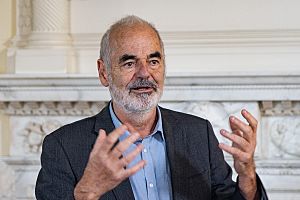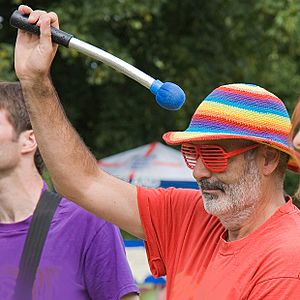David Spiegelhalter facts for kids
Quick facts for kids
Sir
David Spiegelhalter
|
|
|---|---|

Spiegelhalter giving a presentation in November 2020
|
|
| Born |
David John Spiegelhalter
16 August 1953 Barnstaple, Devon, England
|
| Alma mater |
|
| Awards |
|
| Scientific career | |
| Fields |
|
| Institutions | |
| Thesis | Adaptive inference using finite mixture models (1978) |
| Doctoral advisor | Adrian Smith |
Sir David John Spiegelhalter (born 16 August 1953) is a famous British statistician. A statistician is an expert who works with data and numbers to understand the world better. He is a Fellow at Churchill College, Cambridge, which is a part of the University of Cambridge.
For many years, he was a professor at Cambridge, where he taught people how to understand risk. Risk is the chance that something good or bad might happen. He is now the Chair of the Winton Centre for Risk and Evidence Communication. This center helps explain risk and scientific evidence to the public in a clear way.
Contents
Early Life and Schooling
David Spiegelhalter was born in Barnstaple, a town in Devon, England. As a boy, he went to Barnstaple Grammar School. He was very good at math.
After finishing school, he went to the University of Oxford to study mathematics. He then went to University College London to learn more about statistics. He earned a Master's degree and later a PhD, which is the highest degree you can get from a university. His final research project was about using math models to make smart guesses from data.
A Career in Numbers
Spiegelhalter began his career as a research assistant at Brunel University. He also spent time as a visiting teacher at the University of California, Berkeley.
In 1981, he started working for the Medical Research Council (MRC) in Cambridge. The MRC uses science to improve people's health. He also worked as a consultant for big companies and for the World Anti-Doping Agency, which makes sure sports are fair.
Spiegelhalter became known for using his statistics skills to help with important investigations. He was part of public inquiries looking into serious problems at hospitals. One famous case involved the doctor Harold Shipman. Spiegelhalter's work showed that by looking at data carefully, the problems could have been spotted much earlier.
From 2007 until he retired from the role in 2018, he was the Winton Professor of the Public Understanding of Risk at Cambridge University. His job was to help everyone, not just scientists, understand numbers and risk in daily life.
What is Statistics?
Statistics is a branch of math that deals with collecting, analyzing, and explaining data. Data is just information, usually in the form of numbers. Spiegelhalter's work shows how statistics can be used for many things, from medicine to understanding the news.
Bayesian Statistics
One of Spiegelhalter's main interests is Bayesian statistics. This is a way of thinking about probability. Probability is the measure of how likely something is to happen.
The Bayesian method updates what you believe about something as you get more evidence. For example, if you think a coin is fair (50% heads, 50% tails), but you flip it 10 times and get 9 heads, Bayesian statistics would help you update your belief that the coin might not be fair after all.
In the 1990s, Spiegelhalter helped create a computer program called WinBUGS. This powerful tool helped scientists all over the world use Bayesian ideas to solve complex problems, especially in health and science.
Understanding Risk
Spiegelhalter is famous for making risk easier to understand. He came up with ideas like the "micromort" and the "microlife."
- A micromort is a one-in-a-million chance of death. For example, traveling 230 miles in a car is about one micromort. This helps compare the risk of different activities.
- A microlife is 30 minutes of your life expectancy. Things like smoking two cigarettes or eating a burger can cost you one microlife. Exercising for 20 minutes can gain you two microlifes.
These ideas help people make better decisions about their health and safety by putting risks into a context they can understand.
On TV and in the Media
Spiegelhalter has appeared on many TV shows and podcasts to share his love for numbers. In 2012, he hosted a BBC Four show called Tails You Win: The Science of Chance. The show explained how probability affects our lives every day.
He also started his own podcast in 2020 called Risky Talk. In each episode, he talks to other experts about risk related to topics like climate change, food, and health. He wants to help people trust numbers and use them to make sense of the world.
Awards and Recognition
Because of his important work, Sir David Spiegelhalter has received many awards.
- He was elected a Fellow of the Royal Society (FRS) in 2005. This is a huge honor for a scientist in the UK.
- In 2014, he was knighted by the Queen for his services to statistics. This is why he is called "Sir" David.
- The Royal Statistical Society, an organization for statisticians, has given him three of its top awards: the Guy Medal in Bronze, Silver, and Gold.
Media Appearances
Spiegelhalter has been on many TV and radio shows to explain science and math to the public. Some of them include:
- The Joy of Stats (2010)
- Tails You Win: The Science of Chance (2012)
- Climate Change by Numbers (2015)
- Desert Island Discs (2022)
 | DeHart Hubbard |
 | Wilma Rudolph |
 | Jesse Owens |
 | Jackie Joyner-Kersee |
 | Major Taylor |


